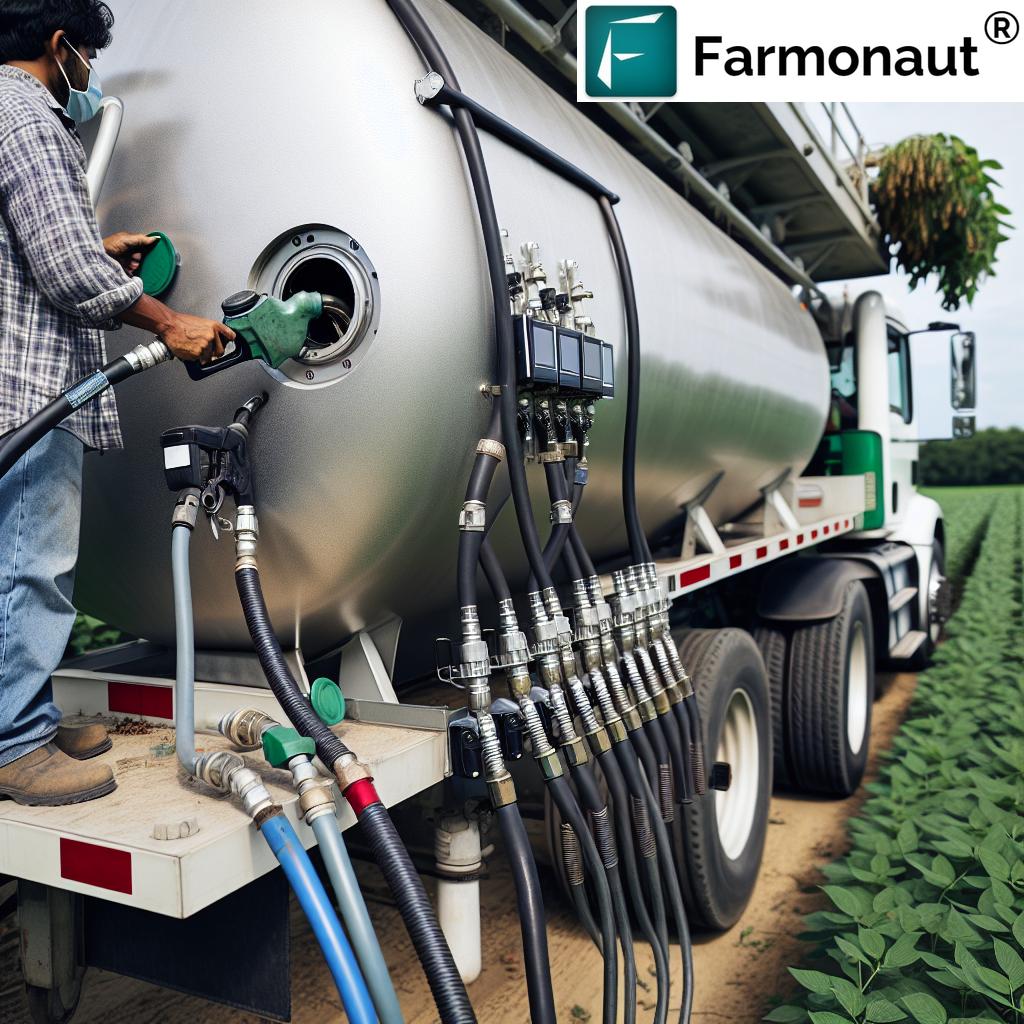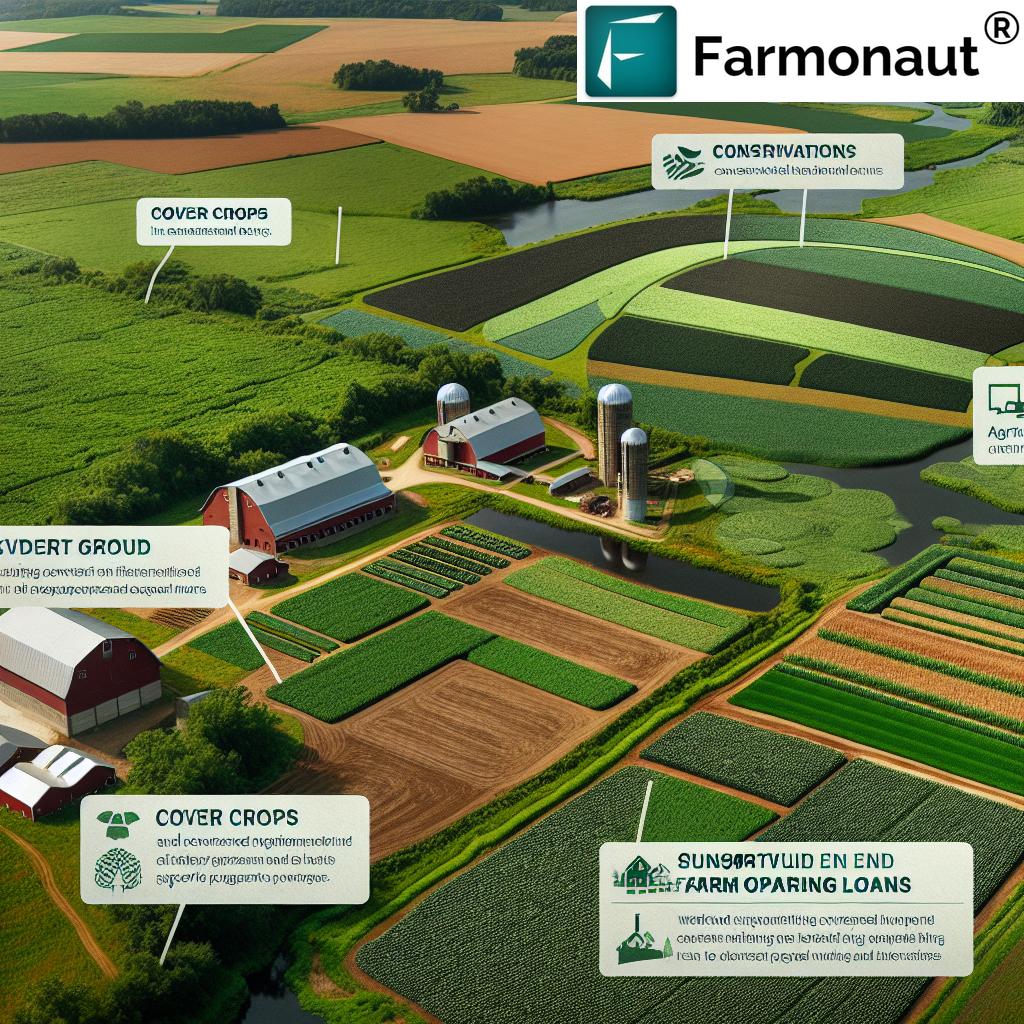Revolutionary Fuel Spill Prevention: Boosting Farm Efficiency and Sustainability in North Dallas
“Innovative fuel tank safety devices can reduce farm fuel costs by up to 15% through spill prevention and efficient management.”
Welcome to the future of farming in North Dallas! At Farmonaut, we’re excited to explore the cutting-edge advancements in fuel spill prevention that are revolutionizing agricultural operations. As pioneers in precision agriculture technology, we understand the critical role that efficient fuel management plays in modern farming. Today, we’ll delve into the innovative solutions that are not only enhancing farm machinery efficiency but also promoting sustainable farming practices across North Dallas and beyond.

The Imperative of Fuel Spill Prevention on Farms
In the heart of North Dallas, where agriculture thrives, the need for fuel spill prevention on farms has never been more crucial. As we push towards more sustainable and efficient farming practices, the management of fuel resources becomes a cornerstone of modern agriculture. Let’s explore why this is so important:
- Environmental Protection: Preventing fuel spills safeguards our soil and water resources from contamination.
- Cost Efficiency: Minimizing fuel waste directly impacts the bottom line for farmers and agribusinesses.
- Safety: Proper fuel handling reduces the risk of accidents on farms and construction sites.
- Regulatory Compliance: Adhering to fuel management standards helps farms stay compliant with environmental regulations.
As we continue to innovate in the field of precision agriculture technology, we’re seeing remarkable advancements in portable fuel tank safety devices that are changing the game for farmers in North Dallas and beyond.
Cutting-Edge Portable Fuel Tank Safety Innovations
The latest developments in portable fuel tank safety are nothing short of revolutionary. These devices are designed to prevent spills during transportation and refueling, ensuring that every drop of fuel is used efficiently and safely. Let’s take a closer look at some of the features that make these innovations stand out:
- Smart Locking Mechanisms: Prevent accidental openings during transport.
- Overflow Prevention Systems: Automatically stop fuel flow when tanks are full.
- Leak Detection Technology: Alert operators to potential leaks before they become problematic.
- Durability: Constructed to withstand the rigors of farm and construction environments.
These advancements not only contribute to fuel spill prevention on farms but also play a significant role in enhancing overall farm machinery efficiency.
Agricultural Equipment Maintenance: A Key to Efficiency
Agricultural equipment maintenance is crucial for ensuring the longevity and efficiency of farm machinery. With the integration of fuel spill prevention devices, maintenance routines have evolved to include regular checks and calibrations of these safety systems. Here’s how proper maintenance contributes to overall farm efficiency:
- Reduced Downtime: Well-maintained equipment is less likely to break down during critical farming operations.
- Extended Equipment Lifespan: Regular maintenance, including fuel system checks, can significantly extend the life of farm machinery.
- Optimized Performance: Properly maintained equipment operates at peak efficiency, consuming fuel optimally.
- Cost Savings: Preventive maintenance is often less expensive than repairs or replacements due to neglect.
By prioritizing equipment maintenance and incorporating fuel spill prevention measures, farmers in North Dallas are seeing remarkable improvements in their operations’ efficiency and sustainability.
Precision Agriculture Technology: Revolutionizing Fuel Management
Precision agriculture technology is at the forefront of revolutionizing fuel management on farms. At Farmonaut, we’re proud to be part of this technological revolution, offering advanced satellite-based solutions that complement fuel management systems. Here’s how precision ag tech is making a difference:
- Real-Time Monitoring: Track fuel usage across your farm in real-time, identifying inefficiencies quickly.
- Data-Driven Decisions: Use analytics to optimize fuel consumption based on crop needs and field conditions.
- Integration with Farm Management Systems: Seamlessly incorporate fuel data into broader farm management strategies.
- Predictive Maintenance: Use AI to predict when equipment might need servicing to prevent fuel-related issues.
The integration of precision agriculture technology with fuel management systems is creating a new paradigm for farm machinery efficiency and sustainable farming practices.
Construction Site Fuel Management: Lessons for Agriculture
While our focus is on agriculture, there’s much to be learned from construction site fuel management practices. The challenges faced in construction — such as managing multiple pieces of heavy machinery and dealing with varied terrain — mirror many of the issues farmers encounter. Here’s what agriculture can adopt from construction fuel management:
- Centralized Fueling Stations: Reduce the risk of spills by establishing dedicated fueling areas.
- Fuel Tracking Systems: Implement digital systems to monitor fuel allocation and usage across all equipment.
- Emergency Response Plans: Develop and regularly update plans for dealing with potential fuel spills.
- Staff Training: Ensure all personnel are trained in proper fuel handling and spill prevention techniques.
By adopting these practices, farms in North Dallas can significantly enhance their fuel management strategies, leading to improved efficiency and reduced environmental impact.
“Advanced fuel spill prevention technology undergoes rigorous durability testing, withstanding over 10,000 operational cycles without failure.”
Sustainable Farming Practices: The Role of Efficient Fuel Use
Sustainable farming practices are not just about crop rotation and water conservation; they also encompass efficient fuel use. By implementing advanced fuel spill prevention measures and optimizing fuel consumption, farmers are taking significant strides towards sustainability. Here’s how efficient fuel use contributes to sustainable farming:
- Reduced Carbon Footprint: Less fuel waste means lower greenhouse gas emissions from farm operations.
- Conservation of Resources: Efficient fuel use preserves non-renewable energy sources.
- Soil Protection: Preventing fuel spills helps maintain soil health and biodiversity.
- Economic Sustainability: Lower fuel costs contribute to the long-term economic viability of farms.
At Farmonaut, we’re committed to supporting sustainable farming practices through our precision agriculture solutions, which complement these fuel efficiency measures.

Crop Planting Optimization: Fuel Efficiency from the Start
Crop planting optimization is a critical aspect of modern farming that directly impacts fuel efficiency. By optimizing planting processes, farmers can reduce the number of passes over their fields, thereby minimizing fuel consumption. Here’s how advanced planting techniques contribute to fuel efficiency:
- Precision Seeding: Accurate placement reduces the need for replanting and excessive field operations.
- Variable Rate Technology: Apply seeds and inputs based on field variability, optimizing resource use.
- Auto-Steering Systems: Reduce overlap and minimize fuel waste during planting operations.
- Optimal Route Planning: Use GPS and field mapping to determine the most efficient planting routes.
These practices not only save fuel but also contribute to better crop emergence and overall farm profitability.
Farm Equipment Innovations: Beyond Fuel Spill Prevention
While fuel spill prevention is crucial, farm equipment innovations extend far beyond this aspect. Modern agricultural machinery is becoming smarter, more efficient, and more sustainable. Let’s explore some of the latest innovations:
- Electric and Hybrid Tractors: Reducing reliance on fossil fuels and minimizing emissions.
- Autonomous Vehicles: Self-driving tractors and harvesters that optimize fuel use and increase precision.
- IoT-Enabled Equipment: Machinery that communicates in real-time, allowing for proactive maintenance and fuel management.
- Lightweight Materials: Reducing the weight of equipment to improve fuel efficiency without compromising durability.
These innovations are transforming the agricultural landscape, making farms more efficient and environmentally friendly.
Explore Farmonaut’s API for advanced agricultural insights
Agricultural Fuel Cost Savings: Strategies for Success
Implementing effective strategies for agricultural fuel cost savings is essential for maintaining a competitive edge in today’s farming industry. Here are some proven strategies that farms in North Dallas and beyond can adopt:
- Regular Equipment Maintenance: Well-maintained machinery operates more efficiently, consuming less fuel.
- Tire Pressure Management: Proper tire inflation reduces rolling resistance and fuel consumption.
- Efficient Field Operations: Combine tasks when possible to reduce the number of passes over a field.
- Alternative Fuels: Consider biodiesel or other alternative fuels where appropriate.
- Fuel Storage and Handling: Invest in quality storage tanks and handling equipment to prevent losses.
By implementing these strategies, farms can significantly reduce their fuel costs while also contributing to more sustainable operations.
Fuel Spill Prevention Device Comparison
| Device Type | Compatible Equipment | Spill Prevention Mechanism | Durability Rating (1-5) | Installation Complexity | Estimated Fuel Savings (%) | Environmental Impact Reduction | Initial Cost Range ($) | Long-term ROI (Estimated years) |
|---|---|---|---|---|---|---|---|---|
| Portable Fuel Tank Safety Device | Skid tanks, Field trucks | Automatic shut-off valve | 4 | Low | 10-15% | High | 500-1000 | 1-2 |
| Smart Fuel Management System | All farm machinery | AI-driven monitoring and control | 5 | High | 15-20% | High | 2000-5000 | 2-3 |
| Leak Detection Sensors | Fuel storage tanks | Early warning system | 3 | Medium | 5-10% | Medium | 300-800 | 2-4 |
| Automatic Shut-off Valves | Refueling systems | Mechanical flow stop | 4 | Medium | 8-12% | Medium | 400-1200 | 1-3 |
| Spill Containment Barriers | Fuel storage areas | Physical containment | 3 | Low | 2-5% | Medium | 200-600 | 3-5 |
This comparison table provides a comprehensive overview of various fuel spill prevention devices available for farm equipment. It helps farmers and agricultural managers make informed decisions about which technologies to implement based on their specific needs and budget constraints.
The Future of Fuel Management in Agriculture
As we look to the future, the integration of advanced technologies in fuel management promises even greater efficiencies and sustainability in agriculture. Here are some trends we’re watching closely:
- AI-Powered Fuel Optimization: Machine learning algorithms that continually refine fuel usage based on operational data.
- Blockchain for Fuel Tracking: Ensuring transparency and traceability in fuel supply chains.
- Renewable Energy Integration: Combining traditional fuel management with on-farm renewable energy sources.
- Nanotechnology in Fuel Systems: Enhancing fuel efficiency and reducing emissions at the molecular level.
At Farmonaut, we’re excited to be at the forefront of these technological advancements, offering solutions that complement and enhance fuel management strategies.
Check out our API Developer Docs for integration possibilities
Conclusion: Embracing Efficiency and Sustainability
The revolution in fuel spill prevention and management is more than just a technological advancement; it’s a fundamental shift towards more efficient, sustainable, and profitable farming practices. By embracing these innovations, farmers in North Dallas and beyond are not only protecting their bottom line but also safeguarding the environment for future generations.
From portable fuel tank safety devices to precision agriculture technology, the tools available today offer unprecedented control over fuel usage and spill prevention. As we continue to innovate and refine these technologies, the future of agriculture looks brighter, cleaner, and more sustainable than ever before.
At Farmonaut, we’re committed to supporting farmers in this journey towards greater efficiency and sustainability. Our precision agriculture solutions complement fuel management strategies, offering comprehensive insights that drive smarter decision-making across all aspects of farm operations.
Frequently Asked Questions
- Q: How do portable fuel tank safety devices work?
A: Portable fuel tank safety devices typically use a combination of mechanical and electronic systems to prevent spills. This can include automatic shut-off valves, overflow sensors, and leak detection technology. - Q: Can precision agriculture technology really help with fuel management?
A: Yes, precision agriculture technology can significantly improve fuel management by optimizing routes, reducing unnecessary passes over fields, and providing data-driven insights for more efficient operations. - Q: Are there any government incentives for implementing fuel spill prevention measures on farms?
A: While incentives vary by location, many regions offer tax breaks or grants for implementing environmental protection measures, which can include fuel spill prevention technologies. - Q: How often should fuel spill prevention devices be checked or maintained?
A: Most manufacturers recommend monthly checks and annual professional maintenance, but this can vary based on usage and specific device requirements. - Q: Can these fuel management systems integrate with existing farm management software?
A: Many modern fuel management systems are designed to integrate with broader farm management software, allowing for comprehensive oversight of all farm operations.
Farmonaut Subscriptions
By leveraging these advanced technologies and strategies, farms in North Dallas and across the globe can significantly reduce their environmental impact while boosting efficiency and profitability. The future of agriculture is here, and it’s cleaner, smarter, and more sustainable than ever before.















